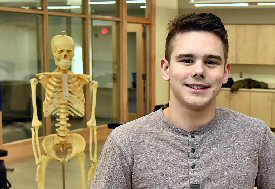
SUNY Oswego
04/02/2019
OSWEGO — SUNY Oswego students have taken on teammates from the Netherlands — a class of students at The Hague University of Applied Sciences — to help inform health promotion plans for St. Francis Commons assisted-living residents.

The teamwork works both ways: Students here are offering an American perspective on their counterparts’ nutrition- and exercise-focused public health project for younger residents of the Netherlands.
Titled “Health Promotion Across Borders,” the transatlantic initiative is the first-ever collaborative online international learning (COIL) course for the department of health promotion and wellness (HPW) in SUNY Oswego’s School of Education.
“This is monumental that Dr. Seo got this COIL course going,” Sandra Bargainnier, chair of HPW, advised the 16 students in Minjung Seo’s class as the five-week cooperative effort got under way in March. “Take this very seriously, because globalization is happening. International relationships can lead to international jobs, the jobs of the future.”
Seo and The Hague University’s Tonnie van Genugten, who met at a 2017 conference, moderated the initial Skype session, teamed one or two of the 20 students at the Netherlands school with each of the Oswego students for an initial meeting via Skype. The classes made it work despite a six-hour time difference.
Understandably awkward at first, it wasn’t too long before the virtual teammates warmed up to each other and began asking about each other’s climate, food, exercise and more. Since then, the small teams of students have undertaken weekly topics provided by their respective professors, collaborating over social media, email and additional Skype sessions.
Transatlantic talks
Thanks to COIL, participating students are sensitized to the larger world by deepening their understanding of themselves, their culture, how they are perceived and how they perceive others. These globally networked courses also intensify disciplinary learning in fields where engaging other cultural perspectives is key.
“This collaboration also offered opportunities to build intercultural communication skills by practicing interviewing techniques — Skype, WhatsApp, Padlet, and so on — and improved digital communication skills,” Seo said. “Excellent communication skills and cultural sensitivity are essential in health promotion.”
Oswego junior wellness management major Maxim Kutepov has communicated numerous times with his Dutch university counterparts, Marlinda Vandenburg and Melanie Nevaart.
“We talk (in English) about our projects,” said Kutepov, who moved to the United States from his native Belarus when he was 5. “At St. Francis Commons, my team here is making a plan to help elderly people who are at risk of developing osteoporosis. We are focusing on awareness and prevention. They are dealing with younger kids on behaviors to prevent (Type II) diabetes. They’re more of a nutrition college, which is interesting.”
One of the primary learning objectives in Seo’s class is for the students to learn about lifestyles and health promotion from a different culture’s perspective.
“I think it’s really cool,” said Kutepov, a New City resident who is keyed on a nursing career. “We connect from different parts of the world and compare things like gyms and dining halls. They bike everywhere in the Netherlands. Here, there’s not as much biking.”
Kutepov shared a photo of the McDonald’s restaurant near SUNY Oswego. That floored his Dutch teammates, who couldn’t believe how big it is – theirs is tiny, he said.
‘Eye-opening experience’
After weeks of these virtual meetings, Seo’s and van Genugten’s classes soon will have a final group Skype session to assess how the experience has gone. Students on each side of the ocean then will work to complete their respective health promotion plans. Teams in Kutepov’s class at SUNY Oswego already have made a fact-finding trip to St. Francis Commons to develop a needs assessment for the kinds of health issues that can benefit from a promotional plan.
“It has been a wonderful experience for students to learn about the socio-ecological perspectives of health that are critical when developing evidence-based health promotion programs,” Seo said. “(For example,) the assignment of sharing pictures and videos of social and physical environments of their target populations provided an eye-opening experience for the students from the two different countries.”
The State University system encourages collaborative international learning courses, and offers assistance to interested professors through the COIL Institute for Globally Networked Learning in the Humanities in New York City. Oswego has undertaken COIL initiatives several times over the past nine years.
“Going forward, Dr. Genugten and I are planning on expanding this opportunity to other sections of major courses,” Seo said. “Moreover, working with Oswego’s Office of International Education and Programs, we are working on creating study aboard and internship opportunities at each other’s colleges.”
The health promotion and wellness department at SUNY Oswego offers a bachelor of science degree program in wellness management, either in person, all online or a hybrid of both. There also are minors in athletic coaching, nutrition and health science, as well as a graduate certificate in health and wellness.
For more information on the health promotion and wellness program, visit oswego.edu/hpw, email [email protected] or call 315-312-6386.